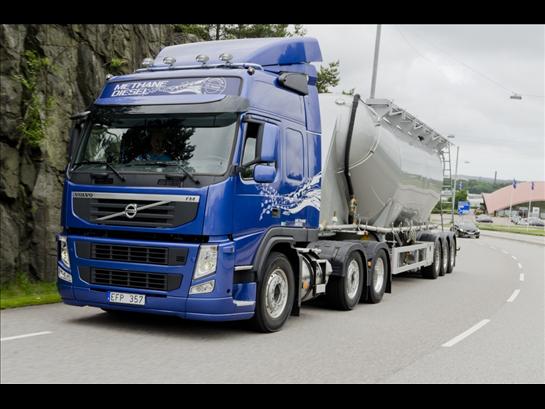Volvo Trucks and Shell have agreed to cooperate globally on the introduction of Liquefied Natural Gas (LNG) as a fuel for commercial heavy duty trucks. Based on Volvo’s new MethaneDiesel concept whereby LNG can be used in diesel engines, and Shell’s LNG expertise and infrastructure investments, the two companies will coordinate their activities and actively support the wider use of LNG in the transport sector.
“Shell is a key player in this market and we are one of the leading truck manufacturers, with an energy-efficient gas truck already available on the market. Together we believe that we can enhance and speed up the introduction of LNG to the transport business, both through own activities and by inspiring others”, says Lennart Pilskog, Director of Public Affairs at Volvo Trucks.
The collaboration agreement is underway and work has begun with the first stage focused on selected markets in central Europe and in the United States.
The agreement is non-exclusive both ways. On-going or future cooperation and dialogues with other partners will not be affected by this agreement.
Gas for long haul transports
Natural gas is today used in compressed form (CNG) in city buses and smaller commercial vehicles. However, to be able to perform long haul assignments the vehicle must be able to carry a larger amount of fuel on board. This is made possible if the engine can run on LNG since the gas has a smaller volume in liquefied form.
The Volvo FM MethaneDiesel is equipped with the new methane-diesel technology and uses liquefied gas as its main fuel. The truck is already available in Sweden, Norway, Belgium, Spain, the Netherlands and the UK and at present the market roll-out is expanding into Italy and France.
“We see considerable potential for our gas truck and will continue the roll-out in more markets along with the development of our production capacity and gas infrastructure. Using liquefied natural gas in a diesel engine is very energy-efficient, it is a new fuel option that could dominate for heavy duty vehicles for the foreseeable future,” concludes Lennart Pilskog.
Wider use of LNG will also facilitate the distribution of liquefied biogas (LBG) produced from renewable sources.
About natural gas and biogas
Both natural gas and biogas consist primarily of methane. When natural gas is combusted, it releases less CO2 than does diesel oil, and it releases no sulphur, heavy metals or ash into the atmosphere. Natural gas reserves are calculated to last longer than crude oil reserves. Biogas is climate-neutral and can be made from waste and other organic sources.
Liquefied Natural Gas (LNG) is natural gas that has been cooled to the point that it becomes liquid. It is mainly used in the production of heat and electricity, making it widely available already today. It is normally less expensive than diesel.
About the Volvo FM MethaneDiesel
Driving range is approximately 1,000 km on gas. Engine power output is 460 hp, torque 2300 Nm. Used in vehicle rigs with a gross weight of 40-60 tonnes. The engine uses diesel to ignite the LNG. The proportions are up to 75% gas and 25% diesel, depending on the type of transport and driving cycle. In the pressurised tank, the gas is stored at a temperature of between -130 and -140 degrees Celsius in order to keep it in liquid form. Can run on both LNG and LBG. Euro 3 and Euro 5 engines can also run on diesel only, which can be advantageous in situations when no LNG is available.
The Volvo FM MethaneDiesel is already available in Sweden, Norway, Belgium, Spain, the Netherlands and the UK and at present the market roll-out is expanding into Italy and France.


